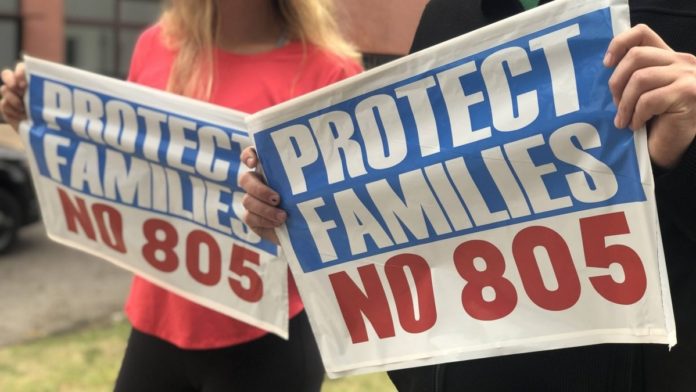
Last Updated on February 28, 2022, 2:07 PM | Published: February 28, 2022
OKLAHOMA CITY (Free Press) — Several Oklahoma lawmakers are looking to add hurdles for citizen-led groups to pass the type of state questions that legalized medical marijuana, expanded Medicaid and won voter support despite Republican leaders opposition in recent years.
More than a dozen bills up for consideration, all authored by GOP legislators, seek to either tighten requirements for citizen-led voter initiatives to get on the ballot or increase the threshold for some of the proposals to pass on election day. .
These include proposals to:
- Require a majority of voters in two-thirds of Oklahoma counties to vote for some state questions to take effect statewide;
- mandate background checks for petition circulators;
- and block out-of-state donations for initiative or referendum campaigns.
The bills have not been heard yet. But Gov. Kevin Stitt and several GOP lawmakers have voiced concerns that Oklahoma’s state question process should be tightened.
This follows the passage of several high-profile state questions opposed by the governor and many in the GOP-dominated Legislature.
Since 2016, voters through citizen-led initiatives have expanded Medicaid to more than 200,000 low-income Oklahomans, changed several drug and non-violent crimes from felonies to misdemeanors and made Oklahoma one of the nation’s largest and most accessible medical marijuana markets.
Stitt took specific aim at the medical marijuana ballot question during his State of the State speech when he said it was “misleading” and said voters were sold a “bill of goods.” He went on to blame organizations outside of Oklahoma for influencing the elections.
“You know as well as I do that not all of that product is being sold legally,” the governor said. “This is a perfect example why we need to make sure initiative petitions represent Oklahomans, not out-of-state special interest groups.”
More complicated picture
An Oklahoma Watch review of campaign finance filings since 2016 shows a more complicated picture.
Some state questions ere largely funded by out-of-state groups, including the failed 2016 proposal to allow optometrists to practice in retail locations and the successful passage of sentencing reforms. But several other hot-button races did not see much out-of-state money.
More than 97% of the pro-medical marijuana campaign funding for that 2018 state question came from inside Oklahoma. State residents and groups produced 86% of the pro-medicaid expansion campaign funds in 2020.
State questions put on the ballot through the Legislature saw a mix in their funding sources. While some legislatively assigned state questions didn’t see much out-of-state funding, a select few did. More than 93% of the $5.5 million spent on 2016’s alcohol-sales reforms came from out-of-state.
Asked to clarify Stitt’s statements during the State of the State, the governor’s office said he was not talking specifically here about medical marijuana, but instead a broader mention of initiative petitions.
“The governor’s point here is that right now, outside groups have too much influence in pushing these initiatives and, as he stated during State of the State, Oklahomans deserve to know exactly what they’re voting for,” said Stitt spokeswoman Carly Atchison in an emailed statement to Oklahoma Watch.
Atchison said the governor’s office usually doesn’t comment about pending legislation and wouldn’t say if there were any specific bills or plans that the governor supports.
A Question of Control?
Stitt isn’t the only one who is making claims about undue out-of-state influence in the state questions.

State Sen. Warren Hamilton, R-McCurtain, announced he is sponsoring a proposal, Senate Joint Resolution 30, to require state questions that change the constitution or “take away rights” of Oklahomans be approved by a two-thirds majority vote of all Oklahoma counties to pass and be written into the state’s constitution. If a majority of voters approve the question, but not two-thirds of Oklahoma’s 77 counties, the amendment would only take effect in the countries that approved it.
Hamilton did not respond to Oklahoma Watch’s multiple requests for comment.
In a press release about his proposal, Hamilton said “state questions are a way for out of state liberal groups who are not accountable to us to spread half-truths and lies and to circumvent our legislature.”
Hamilton, who has previously made unfounded accusations about the 2020 presidential race, went on to make claims, without any evidence, that state question elections are a “golden opportunity for voter fraud, election tampering.”
Amber England, who ran the successful 2020 Medicaid expansion campaign, said these are scare tactics lawmakers use because they don’t want to cede control to voters.

“What you are hearing is politicians and the governor trying to make it harder for Oklahomans to use their voice to decide issues for themselves,” she said. “It’s disappointing, but not entirely surprising, because politicians like to control things and consolidate power for themselves.”
Oklahoma is one of 28 states that has an initiative process, according to the National Conference of State Legislatures. But it is more restrictive to get on the ballot here than in many states.
After filing a copy of the petition with the state and getting the go-ahead to proceed, citizen-led campaigns must collect enough signatures of registered voters to equal 8% of votes cast in the most recent gubernatorial election — 15% for constitutional changes. For the upcoming year, this would require nearly 95,000 signatures for statutory changes and almost 178,000 for constitutional ones.
All of that must be completed in a 90-day window.
To get on the ballot, the question must also survive potential legal challenges that can send organizers back to square one.
If anything, England said, Oklahoma should make it easier to get on the ballot.
“There are a lot of (initiatives) that have been filed, but to make it all the way through the process … it is hard,” she said. “And I get that it should be tough, but it shouldn’t be rigged (against) everyday Oklahomans.”
‘A Bit Higher Standard’
State Rep. Carl Newton, R-Waynoka, who is sponsoring a bill that would require 55% of voters to approve a state question. Newton said he is not looking to take away power from the people.

“I just think it should be a bit higher standard,” he said.
Newton is a co-sponsor on a House proposal seeking to ban out-of-state campaign contributions for state question campaigns.
“Do we need New York, California or some state out there sending in a bunch of money trying to influence our elections?” he said. “I just think Oklahomans should support Oklahomans.”
Newton said he doesn’t think candidates — who often receive big donations from out-of-state companies or political action committees — should have the same restriction.
It is unclear which, if any, of the proposals to tighten state question requirements the Legislature will take up.
Last year, a number of bills sought to increase thresholds for state questions, but lawmakers pushed through only relatively minor changes.
Included was a law requiring citizen-led groups to include a fiscal impact statement — with a proposed a funding source if there is a cost. Another set out procedures for recounting state question ballots if there is a close race.
England said she hopes that in an election year, legislators will see it’s a bad move to take power away from the voters. She said activists will be working to stop these type of proposals if they gain traction in the Legislature or at the ballot box.
“I believe we should mount an aggressive no campaign and shut this down once and for all,” she said. “But I just really hope we don’t have to spend the next eight months fighting these.”
First published in Oklahoma Watch on February 28, 2022, and published here under Creative Commons license. Free Press publishes this report as a collaborative effort to provide the best coverage of state issues that affect our readers.
Trevor Brown was an Oklahoma Watch reporter from 2016 to mid-2022. He covers politics, elections, health policies and government accountability issues. Call or text him at (630) 301-0589. Follow him on Twitter at @tbrownokc.










